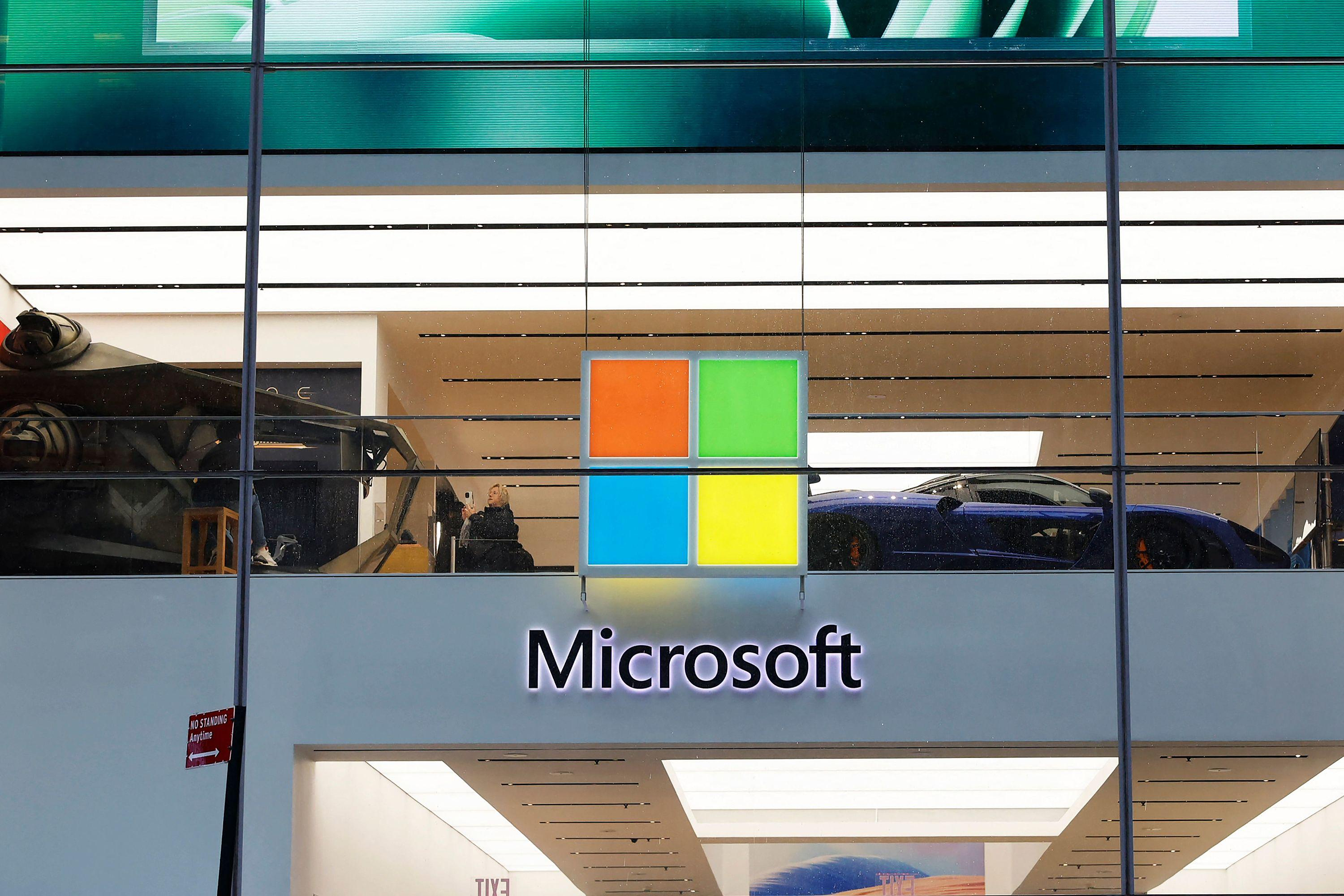Microsoft announced Tuesday that it would invest $2.9 billion over the next two years in Japan to strengthen the development of artificial intelligence (AI) in this country, currently lagging behind in this now crucial technological sector. The commitment coincides with Japanese Prime Minister Fumio Kishida's state visit to Washington on Wednesday, who stressed his country's determination to become a major power in AI.
Microsoft established itself as a key player in AI last year thanks to its partnership with OpenAI, the start-up that created the famous chatbot ChatGPT, to the point of dethroning Apple as the largest company in the world in terms of market capitalization. “This is Microsoft’s largest investment in its 46-year history in Japan,” said Brad Smith, president of Microsoft, in a statement.
The agreement includes the provision of "more advanced computing resources", he detailed, including ultra-advanced computer chips (GPUs), crucial for training AI models, and a strengthening of infrastructure of Microsoft in the “cloud” (dematerialized computer storage) in Japan. The US tech giant also pledged to invest in AI training for three million Japanese workers over the next three years, and announced the opening of its first lab in Tokyo, Microsoft Research Asia, which will work on AI and robotics.
The United States and Japan also announced two AI research partnerships between universities in their countries on Tuesday. These partnerships will be supported to the tune of $110 million by private companies, including Microsoft, Nvidia and Amazon, as well as the Japanese SoftBank Group and its British subsidiary Arm.
AI is increasingly seen by Japanese companies as a means of improving labor productivity in the country, which is among the lowest among OECD countries, notably due to a Japanese market. still rigid employment and a hierarchical corporate culture based on seniority. Artificial intelligence should also help remedy the labor shortage becoming increasingly critical in many sectors of activity in Japan, due to its pronounced demographic decline (nearly 30% of its population is aged 65 and over).
Last year, the boss of SoftBank Group, Masayoshi Son, was alarmed by the delay taken by Japan in AI and urged the country to resolutely adopt these tools, otherwise it risks, according to him, being left behind. » and transform into a “goldfish”. Highlighting the growing importance of cybersecurity amid an increase in breaches and hacks, Microsoft also intends to work with the Japanese government to strengthen the country's cyber defenses, another major concern for Tokyo.
“The range of cybersecurity threats has become more complicated [...]. We're seeing it with China and Russia in particular, but we're also seeing more and more ransomware attacks around the world,” Brad Smith told the Japanese daily Nikkei. Google also opened a cybersecurity center of excellence in Tokyo last month. Various public-private research partnerships in quantum computing and semiconductor engineering were also announced between the United States and Japan last year at the G7 summit in Hiroshima (west), with financial contributions from large American firms such as IBM, Google and Micron.
The Japanese government is also investing very heavily to boost national semiconductor production, a sector where the archipelago has also been left behind in recent decades by its Taiwanese and South Korean neighbors. A first mega-factory from the global giant in the sector, the Taiwanese TSMC, was notably inaugurated in February in the south-west of Japan, and the group has already confirmed that it intends to build a second on site.

 Russia: schools will train children to use drones at the start of the school year
Russia: schools will train children to use drones at the start of the school year Austria: incestuous torturer Josef Fritzl, nicknamed the “national monster”, could soon be released
Austria: incestuous torturer Josef Fritzl, nicknamed the “national monster”, could soon be released An airline continues to treat a centenarian as a one-year-old baby
An airline continues to treat a centenarian as a one-year-old baby Germany: the trial of nine “Citizens of the Reich” conspirators begins this Monday
Germany: the trial of nine “Citizens of the Reich” conspirators begins this Monday Sánchez cancels his agenda and considers resigning: "I need to stop and reflect"
Sánchez cancels his agenda and considers resigning: "I need to stop and reflect" The Federal Committee of the PSOE interrupts the event to take to the streets with the militants
The Federal Committee of the PSOE interrupts the event to take to the streets with the militants Repsol: "We want to lead generative AI to guarantee its benefits and avoid risks"
Repsol: "We want to lead generative AI to guarantee its benefits and avoid risks" Osteoarthritis: an innovation to improve its management
Osteoarthritis: an innovation to improve its management Sanofi: demonstration in front of Paris headquarters against job cuts
Sanofi: demonstration in front of Paris headquarters against job cuts The Chinese car manufacturer BYD sets out to conquer France
The Chinese car manufacturer BYD sets out to conquer France Public finances: after the deputies, Bruno Le Maire asks the senators for savings avenues
Public finances: after the deputies, Bruno Le Maire asks the senators for savings avenues Faced with opposition from London, a fund supported by Abu Dhabi abandons the purchase of the Daily Telegraph
Faced with opposition from London, a fund supported by Abu Dhabi abandons the purchase of the Daily Telegraph Omar Sy on all cultural fronts
Omar Sy on all cultural fronts Jacques Audiard, Swann Arlaud, Benjamin Stora... A hundred men from cinema, theater and books in support of
Jacques Audiard, Swann Arlaud, Benjamin Stora... A hundred men from cinema, theater and books in support of Resale, scams and fake tickets: how not to get scammed before Taylor Swift concerts
Resale, scams and fake tickets: how not to get scammed before Taylor Swift concerts Isild Le Besco is not ready to file a complaint against Benoît Jacquot
Isild Le Besco is not ready to file a complaint against Benoît Jacquot Omoda 7, another Chinese car that could be manufactured in Spain
Omoda 7, another Chinese car that could be manufactured in Spain BYD chooses CA Auto Bank as financial partner in Spain
BYD chooses CA Auto Bank as financial partner in Spain Tesla and Baidu sign key agreement to boost development of autonomous driving
Tesla and Baidu sign key agreement to boost development of autonomous driving Skoda Kodiaq 2024: a 'beast' plug-in hybrid SUV
Skoda Kodiaq 2024: a 'beast' plug-in hybrid SUV The home mortgage firm rises 3.8% in February and the average interest moderates to 3.33%
The home mortgage firm rises 3.8% in February and the average interest moderates to 3.33% This is how housing prices have changed in Spain in the last decade
This is how housing prices have changed in Spain in the last decade The home mortgage firm drops 10% in January and interest soars to 3.46%
The home mortgage firm drops 10% in January and interest soars to 3.46% The jewel of the Rocío de Nagüeles urbanization: a dream villa in Marbella
The jewel of the Rocío de Nagüeles urbanization: a dream villa in Marbella Europeans: a senior official on the National Rally list
Europeans: a senior official on the National Rally list Blockade of Sciences Po: the right denounces a “drift”, the government charges the rebels
Blockade of Sciences Po: the right denounces a “drift”, the government charges the rebels Even on a mission for NATO, the Charles-de-Gaulle remains under French control, Lecornu responds to Mélenchon
Even on a mission for NATO, the Charles-de-Gaulle remains under French control, Lecornu responds to Mélenchon “Deadly Europe”, “economic decline”, immigration… What to remember from Emmanuel Macron’s speech at the Sorbonne
“Deadly Europe”, “economic decline”, immigration… What to remember from Emmanuel Macron’s speech at the Sorbonne These French cities that will boycott the World Cup in Qatar
These French cities that will boycott the World Cup in Qatar Football: the CAS suspends the sanction of Gabigol who will be able to play again
Football: the CAS suspends the sanction of Gabigol who will be able to play again Wrestling: everything you need to know about the sport
Wrestling: everything you need to know about the sport Luis Enrique before Dortmund-PSG: “We must not see pressure as a threat”
Luis Enrique before Dortmund-PSG: “We must not see pressure as a threat” Tennis: the astonishing ploy of Medvedev’s coach to avoid being filmed in his box
Tennis: the astonishing ploy of Medvedev’s coach to avoid being filmed in his box

















